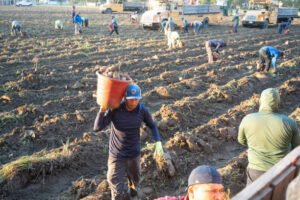Before today, A lot of immigrants have went to Canada to work as a farm worker in Canada and they are not even enough as they are still recruiting more. The Canada’s fields stretch for miles, and every season they call for helping hands. Whether you’re chasing new horizons or simply looking for honest, hands-on work, farm jobs in Canada offer more than just a paycheck, they offer a foothold into a new way of life. Walk through with me in this my guide as I have provided value that will help you securing this jobs in Canada.
Overview of Canada’s Agricultural Sector
Canada’s agricultural sector is recognized as one of the most vital components of the national economy. A wide range of crops, livestock, and greenhouse products are produced across the country. From Ontario’s orchards to Alberta’s cattle ranches, agriculture contributes billions to the GDP annually. This sector is heavily reliant on a consistent and capable workforce, especially during peak harvest periods.
Importance of Farm Workers in Canada
The success of Canadian agriculture has been made possible by the contributions of farm workers. These individuals play a crucial role in planting, maintaining, and harvesting crops, as well as in handling livestock and operating farm machinery. Without their efforts, the production and distribution of food would be severely impacted.
Why Consider Farm Work?
Farm jobs in Canada are often sought after due to their accessibility and potential benefits. Entry-level positions are made available to those with little or no prior experience. Seasonal demand ensures that work is regularly offered across different times of the year. Additionally, opportunities for immigration and long-term settlement have been opened up through various government programs connected to agricultural work.
Types of Farm Jobs in Canada
General Farm Laborers
General farm labor roles are typically filled to assist with planting, weeding, irrigating, and harvesting crops. These positions are considered the backbone of farm operations and are most commonly offered during busy seasons.
Fruit and Vegetable Pickers
These roles involve the manual harvesting of produce such as apples, strawberries, tomatoes, and cucumbers. Work is usually conducted outdoors and is governed by strict timelines based on ripeness and weather conditions.
Greenhouse Workers
Tasks such as planting seedlings, monitoring humidity, and managing pest control are carried out by greenhouse workers. Controlled environments are used to grow vegetables, flowers, and specialty crops year-round.
Livestock Workers
Livestock workers are employed to feed animals, clean enclosures, and assist with breeding and health monitoring. Work is often performed on cattle, poultry, swine, or dairy farms.

Equipment Operators and Technicians
Heavy farm machinery such as tractors, balers, and harvesters must be operated and maintained. These roles are assigned to individuals with mechanical knowledge or formal training in machinery operation.
Who Can Apply?
Canadian Citizens and Permanent Residents
These individuals are eligible to apply directly to farms or through employment agencies without restrictions. Preference may be given to those residing in rural or agricultural communities.
Temporary Foreign Workers (TFWs)
Under the Temporary Foreign Worker Program, labor shortages in farming have been addressed by hiring workers from abroad. Employment is arranged through LMIA-approved employers and supported by government regulations.
Seasonal Agricultural Worker Program (SAWP) Participants
Citizens from specific partner countries, such as Mexico and several Caribbean nations, are selected to work seasonally under the SAWP. Housing and transportation are typically provided as part of the program.
International Students and Open Work Permit Holders
International students and individuals with open work permits are allowed to accept farm work as long as their permits authorize it. These roles offer part-time or full-time income and practical experience in the Canadian job market.
Requirements and Qualifications
Physical Fitness and Ability to Work Long Hours
Farm work is physically demanding and requires stamina. Workers are expected to lift heavy items, stand or bend for long periods, and work in varying weather conditions.
No Formal Education Required for Most Roles
For the majority of farm positions, educational qualifications are not mandatory. Training is usually provided on-site, and tasks are explained through practical instruction.
Basic English or French
Basic language skills in either English or French are preferred to ensure proper communication, safety, and understanding of job responsibilities.
Valid Work Permit (if Foreign)
A valid work permit is required for all foreign nationals employed on Canadian farms. Permits must be obtained prior to arrival and be tied to an eligible employer.
Where to Find Farm Jobs in Canada
Job Boards
Positions are frequently posted on national job boards such as Job Bank, Indeed, and Workopolis. These platforms allow for filtering by location, job type, and employer requirements.
Government Websites
Official Canadian immigration and employment websites list current opportunities through programs like SAWP and TFWP. Application procedures and employer details are provided on platforms such as Canada.ca.
Local Employment Agencies
Rural employment centers and staffing agencies are used to connect workers with regional farms. Seasonal needs are identified, and applicants are matched with appropriate roles.
Word of Mouth and Community Boards
Informal recruitment is conducted through word of mouth in farming communities. Local stores, churches, and bulletin boards often display hiring notices, especially during peak seasons.
What to Expect on the Job
Typical Work Hours and Schedule
Farm workers are typically scheduled to work early mornings and long hours, often exceeding 8 hours per day during peak seasons. Shifts are commonly rotated depending on weather conditions and the type of crop being harvested. Weekends may also be included, especially when time-sensitive agricultural tasks are required.
Working Conditions and Physical Demands
Tasks are often performed outdoors and in various weather conditions. Physical labor is required, including bending, lifting, carrying, and standing for extended periods. Depending on the type of farming, repetitive movements may be expected. Protective gear is usually provided, though personal stamina and strength are heavily relied upon.
Living Arrangements (On-Site Accommodation, Rural Life)
On-site accommodation is frequently offered to foreign and seasonal workers. These living quarters are usually shared and located in rural areas, where access to urban amenities may be limited. Basic facilities such as kitchens, shared bedrooms, and bathrooms are commonly provided. Rural life can be quiet and isolated but is often appreciated for its peaceful environment.
Safety Protocols and Equipment
Safety protocols are enforced by employers and are guided by provincial labor regulations. Safety equipment such as gloves, boots, hats, and protective eyewear is typically issued. Workers are required to attend safety briefings and follow guidelines to prevent injuries. Emergency procedures are communicated, and first aid kits are made available on-site.
Wages and Benefits
Average Hourly Wages (By Province and Job Type)
Wages are determined by provincial standards and job type. As of recent guidelines:
- In Ontario and British Columbia, hourly rates range from CAD $15 to $18.
- In Alberta and Quebec, wages may vary slightly lower or higher based on crop type and demand. Skilled roles, such as machine operators or greenhouse technicians, are compensated at higher rates.
Overtime, Bonuses, and Incentives
Overtime pay is provided in accordance with provincial laws when more than a standard number of hours are worked weekly. In some cases, bonuses are awarded for meeting harvest targets or completing a full season. Incentives may also be offered in the form of food allowances or performance-based rewards.
Access to Healthcare and Other Benefits
Temporary foreign workers are often enrolled in provincial healthcare plans by their employers. Coverage typically begins after a waiting period, and emergency services are provided. Additional benefits, such as sick leave and insurance, may be included depending on the employment contract and province.
Rights and Protections for Farm Workers
Labor Laws and Protections (Provincial/Federal)
Farm workers are protected under both provincial and federal labor laws. Minimum wage, safe work environments, and access to health services are guaranteed. Employers are legally obligated to comply with occupational safety and employment standards.
Rights to Fair Wages, Safe Working Conditions, and Complaint Mechanisms
Workers are entitled to be paid for all hours worked, including overtime. A safe and respectful workplace must be provided. When violations occur, workers are encouraged to report them without fear of retaliation. Complaint mechanisms are managed by labor boards or worker advocacy groups.
How to Report Exploitation or Unsafe Conditions
Incidents can be reported anonymously to provincial labor authorities or through hotlines operated by worker support organizations. Assistance is also available through consulates, legal aid services, and non-profit agencies specializing in migrant worker rights.
Success Tips for Farm Workers
How to Prepare for the Job Physically and Mentally
Proper hydration, physical fitness, and mental resilience are encouraged before arrival. Basic first aid knowledge and stretching exercises can help reduce injuries. An understanding of rural life and work expectations is also beneficial.
Building Good Relationships with Employers
Respectful communication and reliability are often appreciated by employers. By adhering to workplace rules and showing initiative, positive working relationships can be fostered. Feedback is welcomed when given constructively.
Learning Basic English or French Terms Used in Agriculture
Common agricultural terms and safety-related language are recommended to be learned before or during employment. Language classes or mobile translation apps may be used to improve communication and integration.
Saving Money and Managing Finances in Canada
Budgeting is advised due to the seasonal nature of the work. Opening a Canadian bank account, minimizing non-essential expenses, and seeking financial literacy resources can support long-term savings goals.
Real-Life Experiences from Current or Former Farm Workers
Many workers have shared that the experience, while challenging, has been rewarding both financially and personally. Bonds with coworkers and exposure to Canadian culture are frequently highlighted as positive aspects.
Challenges and Successes
Language barriers, cultural adjustment, and physical exhaustion are cited as common difficulties. However, successful completion of contracts, re-hiring opportunities, and skill development are seen as major accomplishments.
Advice for Newcomers from Peers
New workers are advised to arrive well-prepared, stay adaptable, and connect with support networks. Seeking help when needed and maintaining a positive attitude are consistently recommended by experienced workers.

To Conclude…
Summary of Key Points
Farm work in Canada offers accessible job opportunities with fair wages, legal protections, and a chance to contribute to the agricultural economy. While the work is physically demanding, it is valued and supported by multiple programs and laws.
Encouragement to Pursue Farm Work as a Viable Opportunity
For those seeking reliable employment, a path to immigration, or a new experience abroad, Canadian farm work can serve as a worthwhile opportunity. With preparation and resilience, success and growth can be achieved.


















